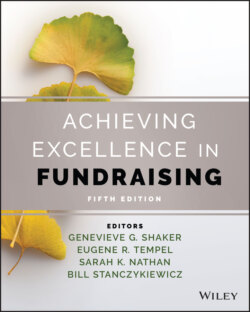Читать книгу Achieving Excellence in Fundraising - Группа авторов - Страница 50
EXHIBIT 2.1. PROPOSED BENEFICIARY BILL OF RIGHTS Beneficiary Bill of Rights
ОглавлениеPhilanthropy is based on longstanding global traditions of offering assistance and support to people and causes beyond oneself. It is a human activity that brings individuals together around common concerns that seek to enhance the quality of life for all. To ensure that philanthropy best serves those intended to benefit from charitable giving, we declare that all beneficiaries of philanthropy have these rights:
1 To be assured that donors and philanthropic and nonprofit organizations are acting in good faith to serve the best interests of the community.
2 To inform leaders of philanthropic organizations, plus donors and fundraisers, of community needs, concerns, and customs by engaging with, listening to, and being responsive to beneficiaries.
3 To be informed of and have access to the leadership of philanthropic and nonprofit organizations engaged in work designed to benefit the community.
4 To expect organizations to embrace an inclusionary practice of community development through collaborative governance that gives agency to all stakeholders.
5 To be at the center of community conversations and involved in framing issues, making plans, taking action, and evaluating outcomes through collaborative decision‐making.
6 To have access to philanthropic and nonprofit organizations' most recent financial statements.
7 To be treated with dignity and respect, with opportunities for direct engagement and a voice in the decision‐making process, which may include board or committee service.
8 To be free to ask questions and offer commentary without reprisal and to receive timely, honest responses.
9 To have the opportunity to participate anonymously, with personal information protected to the extent provided by law.
10 To be appropriately acknowledged for one's community advocacy, if desired.
Beneficiaries are defined as individuals or a group of people who receive direct benefit from philanthropic or nonprofit organizations working on their behalf to serve the public trust.
Source: Anne Bergeron and Eugene R. Tempel 2021. All Rights Reserved.
